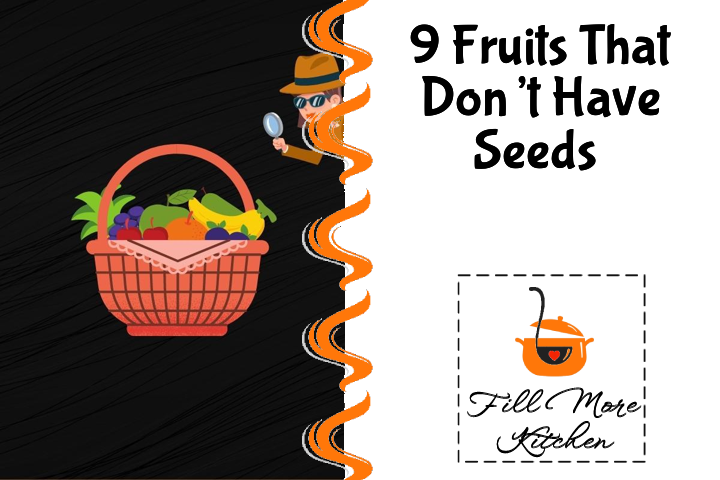Fruits provide us with tasty nutrients and vitamins that are essential for a healthy diet, making them an excellent snack option since most of them require no preparation and can be consumed fresh.
Botanically speaking, fruits are defined as containing seeds, whereas something labeled as a vegetable does not.
From a culinary standpoint, it can be perplexing to classify foods such as avocado, cucumbers, peppers, and tomatoes as fruits since we typically regard them as vegetables.
Today, we will discuss why certain fruits are seedless despite seeds being the determining factor between a fruit and a vegetable.
Our focus will be on 9 seedless fruits, exploring their natural and cultivated methods of becoming devoid of seeds.
Additionally, we will explore various methods of incorporating seedless fruits into culinary creations, so continue reading for delectable ideas!
1. Bananas
Although wild bananas usually contain big black seeds, all bananas can undergo a natural process called parthenocarpy that leads to the production of seedless fruits.
Only bananas with this characteristic were selectively bred by humans, and after years of cultivation, they have evolved into the bananas we currently consume.
2. Pineapples
Similar to bananas, pineapples have been grown for centuries and while wild pineapples contain numerous small seeds and are pollinated by hummingbirds, the pineapples we consume today have been selectively bred over time to be seedless.
3. Watermelon
Watermelon typically contains tough, black seeds that are not edible and also has soft, pale-colored seeds that may go unnoticed if consumed. The seedless variety of watermelon is grown using similar methods as bananas and pineapples.
4. Grapes
Seedless grapes are a result of a genetic mutation that occurred naturally, and grape cultivators propagated more plants that would produce seedless fruit by using vine clippings from the original plants where the seedless grapes were first observed.
5. Coconut
Coconuts are an exceptional inclusion in this list as they lack seeds in their consumable core, although they possess a layer that is comparable to a seed.
Coconut is one of the seedless fruits that has a very smooth and creamy edible part, which is filled with coconut water in the center, unlike other seeded fruits.
Although coconuts are not considered seedless fruits, they still qualify for the list of 9 Fruits That Don’t Have Seeds because they possess all the advantages of seedless fruits without requiring any genetic modification or selective breeding.
6. Citrus
Citrus fruits such as limes, lemons, and oranges are the result of human selection whereby fruits with a reduced number of seeds are chosen and subsequently crossbred to produce plants that yield the same variety of fruit.
The procedure is carried out repeatedly until a seedless type of plant is obtained. The boughs of the triumphant trees are then joined together to create trees that have the same genetic makeup as the initial plant.
7. Tomatoes
Seedless tomatoes are produced by applying hormones on the plant in the initial flowering phases, which hinders natural pollination and halts seed development.
8. Berries
Seedless varieties of certain berries such as blueberries and strawberries can be found naturally, albeit less commonly, just like other seedless fruits.
It is challenging or sometimes not feasible to grow seedless varieties of berries, even with genetic engineering.
9. Cucumbers
Although cucumbers are typically thought of as a vegetable, they are actually classified as a fruit because of their seeds. While some varieties may contain tough seeds, the majority have been selectively bred to possess soft, almost imperceptible seeds that contribute to the fruit’s texture.
Are Seedless Fruits GMOs?
The topic of this question has been frequently discussed, and for valid reasons. The progress in the field of genetic modification has enabled us to achieve some remarkable feats.
GMO, an abbreviation for “genetically modified organism”, refers to an organism that has been altered in a laboratory to retain desirable characteristics while eliminating undesirable ones.
One possible example is the existence of a seed or another physiological characteristic.
Genetically modifying organisms has been a widely discussed topic for various reasons. After researching online, it appears that some individuals have concerns about the process due to the potential effects on our health after consumption.
Despite not having seeds, seedless fruits are not the result of genetic modification. These properties have arisen naturally in plants and have been selectively cultivated by humans.
Why Are Some Fruits Seedless?
Although no fruits are inherently seedless, certain fruits can grow without seeds by developing without fertilization.
When humans cultivate seedless fruit, they replicate a natural process called parthenocarpy that occurs in wild plants.
Parthenocarpy is a genetic variation that occurs in fruits when the ovule, which holds female reproductive cells, remains unfertilized.
The use of plant hormones such as gibberellin, auxin, and cytokinin can also artificially replicate this process.
When Are Seedless Fruits Used in Cooking?
Seedless fruits are ideal for use in cooking as they remove the concern of an unexpected, unpleasant crunch from seeds that may sneak into your delectable dish or dessert.
Seedless lemons can revolutionize many recipes as they eliminate the inconvenience of having to remove seeds before using them, making it easier to add lemon juice to dishes like freshly baked fish or smoothies.
Seedless oranges can be sliced and added to a salad with ease, and they are also more convenient for juicing.
Bananas are an excellent choice of seedless fruit to incorporate into desserts due to their velvety and tender consistency when pureed, which imparts a considerable amount of sweetness and moisture to baked items. They are renowned for their use in preparing banana bread or banana cream pie.
Seedless grapes are ideal for creating jelly with a consistently smooth texture, and they also serve as a refreshing summer treat when frozen.
Grapes are a great salad ingredient, especially the seedless type, which can be easily halved and added to your salad.
Are Seedless Fruits Genetically Modified?
While most seedless fruits are not naturally occurring, they are not necessarily genetically modified; rather, they are typically the result of human intervention in some way.
As previously stated, growers imitate the infrequent phenomenon of parthenocarpy by reproducing solely those plants that have not undergone fertilization.
Nevertheless, certain fruits, such as tomatoes, undergo hormone spraying to guarantee their seedlessness, although this is an infrequent practice in the cultivation and distribution of fruits.
The majority of fruits without seeds have been altered using natural techniques, such as breeding plants that exhibit natural parthenocarpy or fruits with a minimal number of seeds.
The Pros and Cons Of Seedless Fruit
Seedless fruits are unquestionably more pleasurable and expedient to consume while on the move. For instance, relishing a slice of watermelon becomes more delightful when you don’t have to be concerned about expelling the tough, acrid seeds so that you don’t unintentionally chew them.
Seedless fruits typically have a softer and smoother texture compared to their seeded counterparts, resulting in a more enjoyable eating experience. Additionally, they possess a longer shelf life, allowing them to remain fresh for an extended period of time.
Conversely, fruits’ seeds are capable of providing nutrients to them. Therefore, consuming seedless fruits may result in the loss of certain health advantages.
Seeds are also beneficial for digestion and maintaining stable blood glucose levels due to their fiber content.
When fruits are altered using hormones, it can lead to a more significant problem, as consuming genetically modified foods may result in negative impacts on one’s health.
Manipulating the genes of fruits can also result in a detrimental effect on biodiversity.
Fortunately, the majority of seedless fruits available in stores are produced using natural techniques since their seedless counterparts already exist in nature, albeit infrequently.
Although these seedless fruits may not offer the advantages that seeds provide, they are completely safe to consume.
You can also check this video about “9 Fruits That Don’t Have Seeds”
Check out our 10 reviews!
Related posts
https://fillmorekitchen.com/can-you-broil-in-a-gas-oven/
https://fillmorekitchen.com/when-are-kiwis-in-season-around-the-world/
https://fillmorekitchen.com/can-you-leave-meat-out-to-thaw-overnight/
https://fillmorekitchen.com/what-size-sous-vide-container-should-i-buy/
https://fillmorekitchen.com/can-you-eat-pot-roast-left-out-overnight/



